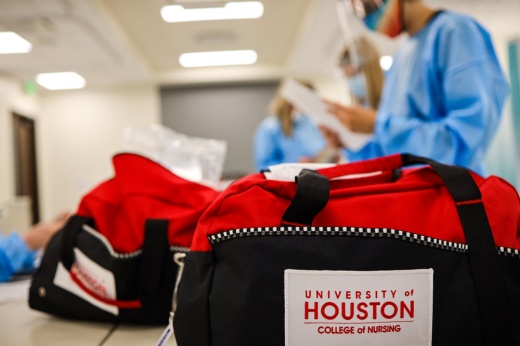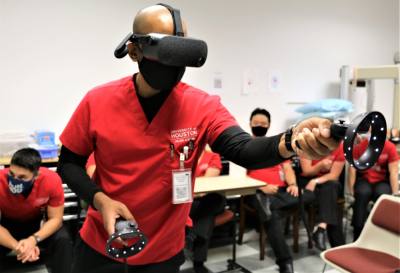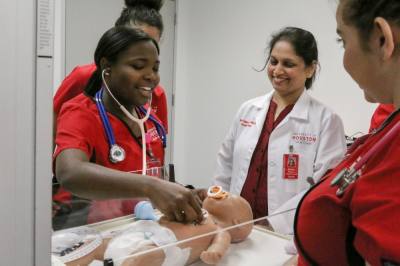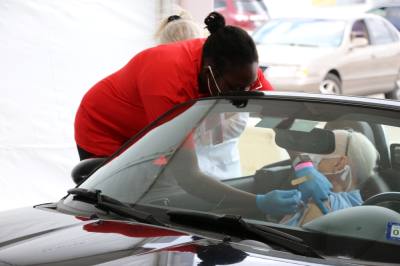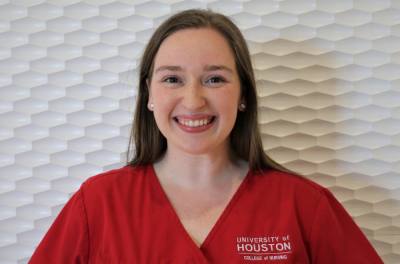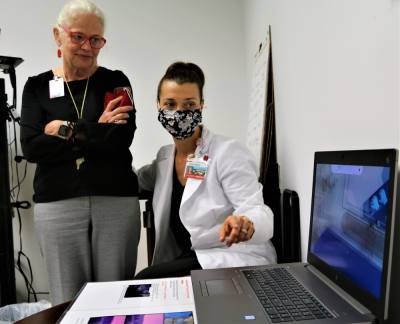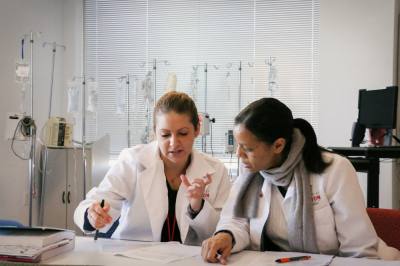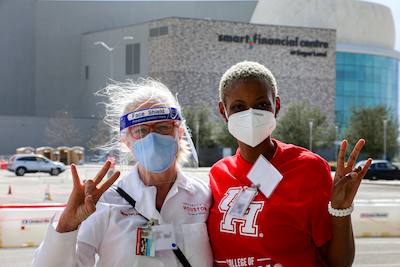In an effort to combat the national nursing shortage, the University of Houston is designing degree programs to support the next generation of nurses.
Prior to the COVID-19 pandemic, the Texas Workforce Commission reported the state would be 57,000 nurses short by 2030 due to various factors, such as more people moving to Texas, an aging population of nurses, and more job opportunities for women compared to decades past. Texas also needs more nurses with a minimum of a master’s degree to teach at the community college or university level so more students can be admitted to nursing programs.
“Those are a lot of the compounding issues,” said Kathryn Tart, dean of the College of Nursing at the University of Houston. “We need clinical sites, we need hospitals to open up, we need more educators, and we need people to help with scholarships.”
The College offers several nursing degree programs and opportunities, including the Second Degree BSN program designed in response to the nursing shortage, which allows students to earn a bachelor’s degree in nursing in one calendar year. Plus, this program is offered at the University of Houston’s instruction site in Sugar Land, giving students on the western side of the metro area the ability to stay close to home and near the abundant number of hospitals in the area.
“We have been extraordinarily successful with that program,” Tart said. “It’s a program where the students are singularly minded. They already have a biology or psychology degree, and now they can study nursing because it’s what they want to do. The students are very driven.”
Everyone admitted to the program has a previous bachelor’s degree, including student Rebecca Ward who will graduate in December and hopes to stay in the Sugar Land area to further her career in nursing.
“I started out in psychology and worked a lot with customer service and human resources in very direct personal relationships,” she said. “I decided to merge my interest in health care and the relationship side of things into one, and that’s how I got into nursing.”
Ward was interested in the accelerated program at the University of Houston at Sugar Land campus because she grew up in the area, liked the idea of an accelerated program, and was attracted to the success rate of the school. Plus, students have the opportunity to learn hands-on skills through 900 clinical hours in local hospitals.
“There’s lots of hands-on experience in the hospital,” Ward said. “You can learn all day from a textbook, but it really solidifies your knowledge when you’re putting that into practice.”
UH also offers a traditional bachelor’s degree in nursing at the Katy Instructional Site, in addition to a master’s in nursing with three tracks: nurse practitioner, nurse administrator or nurse educator. Plus, a new doctor of nursing practice degree is now offered on the main campus, which is the highest degree an individual can earn at the practice level in nursing, Tart said.
“Everything we do has a focus, especially on the graduate level, on teaching,” she said. “That may be one of their goals. They may be teaching at a community college or university, or a hospital. Most nurses will precept other nurses to help teach them. And, of course, we teach our patients.”
In addition to adding these new degree programs to provide more opportunities for the future generation of nurses, UH has more wins under its belt: Its programs have yielded a 100% pass rate for the licensure exam for five years in a row, which places the university in the top 8% of nursing programs in the U.S. Plus, the university was awarded the 2021 Health Professions Higher Education Excellence in Diversity Award—one of only 12 nursing programs to win nationwide.
“Excellence and diversity are not mutually exclusive at the University of Houston,” Tart said. “Our nurses need to mirror the communities they serve.”
Although the pandemic has exacerbated the nursing shortage and burnout among health care workers, it has caused the industry to talk about ways to self-reflect more, talk about the issue openly, and discuss ways to keep nurses passionate about what they do.
“[The pandemic] changed everything. Different hospitals are trying things to reduce burnout by providing extra incentives and breaks for employees to help boost mental health,” Ward said. “One thing UH is doing is talking about it with us and making us aware this is an issue that’s out there. Making sure we’re not overworking ourselves and know our limits.”
But even amid the pandemic, new students continue to enroll in the university’s nursing programs with a goal of making a difference in people’s lives.
“For young people who are trying to decide what it is they want to do, [nursing] gives you a lifetime of experiences that are so fulfilling,” Tart said. “Wherever you are as a nurse, there’s always an element of help in whatever we do.”
The above story was produced by Community Impact's Storytelling team with information solely provided by the local business as part of their "sponsored content" purchase through our advertising team. Our integrity promise to our readers is to clearly identify all CI Storytelling posts so they are separate from the content decided upon, researched and written by our journalism department.
Select your community
Support Us
News
- Austin Metro
-
Houston Metro
- Houston Metro Home
- Bay Area
- Bellaire | Meyerland | West University
- Conroe | Montgomery
- Cy-Fair | Jersey Village
- Cypress
- Heights | River Oaks | Montrose
- Katy | Fulshear
- Lake Houston | Humble | Kingwood
- New Caney | Porter
- Pearland | Friendswood | Manvel
- Spring | Klein
- Sugar Land | Missouri City
- The Woodlands
- Tomball | Magnolia
- Dallas | Fort Worth Metro
- San Antonio Metro




